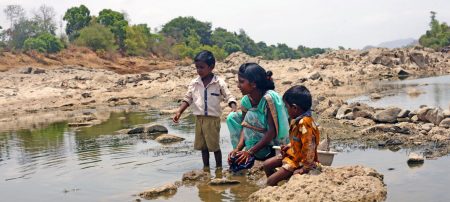UN report on Water, Sanitation and Hygiene 2019 19/06/2019 – Posted in: Daily News
UN REPORT ON WATER, SANITATION AND HYGIENE
For: Preliminary & Mains
Topics covered: Report’s findings, Global vs. India’s outline, WASH initiatives
News Flash
It is found that almost two-thirds of the 650 million people globally who stopped practicing open defecation between 2000 and 2017.
India has also made great gains in providing basic sanitation facilities.
Highlights of the report
A new report from the United Nations Children’s Fund (UNICEF) and the World Health Organization (WHO) highlighted that:
- Some 2.2 billion people around the world do not have safely-managed drinking water
- Around 4.2 billion go without safe sanitation services and three billion lack basic handwashing facilities
- It is also noted that 1-in-10 people still lack basic services, including 144 million individuals who drink untreated surface water. The data illustrates that 8-in-10 people in rural areas lack access to these services.
- No growth is registered in the population with access to piped water facilities over the period of 2000 and 2017.
- The Joint Monitoring Programme report by UNICEF and WHO shows India has increased the percentage of its population with access to a protected drinking water source less than 30 minutes away, from 79% in 2000 to 93% in 2017.
- The percentage of households getting piped water has remained stagnant at 44% over the 17-year period.
- In rural India, only 32% of the population has access to piped water, less than half of the 68% who have access in urban India.
- With regard to sanitation, India’s record has been better.
- India is responsible for dragging the world towards achieving the Sustainable Development Goal of ending open defecation.
- The South Asian region, including India, accounted for almost three-fourths of the population who stopped defecating in the open between 2000 and 2017.
- Of the 2.1 billion people who gained access to basic sanitation services over this time period globally, 486 million live in India.
- The huge number of new toilets which imprint the progress of the Swachh Bharat mission is, however, delivering a large amount of solid and liquid waste that India basically does not be able to treat and discard securely.
- As per the report, just 30% of the nation’s wastewater is treated at plants providing at least secondary treatment, in contrast with an 80% worldwide average.
- Open defecation has been halved since 2000, from 21 percent to 9 percent.
- In 39 countries, the majority of which are in sub-Saharan Africa, the number of people openly defecating has increased.
- Three billion people lacked basic soap and water handwashing facilities at home.
- Every year, 297,000 under-age-five children die from diarrhea linked to inadequate WASH. Poor sanitation and contaminated water also help transmit diseases, such as cholera, dysentery, hepatitis A, and typhoid.
WASH
WASH is the collective term for Water, Sanitation, and Hygiene. Due to their interdependent nature, these three core issues are grouped together to represent a growing sector.
Water: UNICEF’s work in water focuses on the ability for children to access safe water, the quality of the water they can access and the journey they must take to collect it.
Sanitation: For sanitation, UNICEF works to ensure access and use of basic toilets and ways to separate human waste from contact with people. One important area of work for sanitation is to end the practice of “open defecation,” and facilitate community-led initiatives to build, maintain and use basic toilets.
Hygiene: UNICEF’s work in hygiene is aimed at nurturing good hygiene practices, especially handwashing with soap. It is essential to prevent disease and the health of children.
Right to Sanitation
The human right to sanitation implies that people not only have a right to a hygienic toilet but also have a right not to be negatively affected by unmanaged faecal waste.
This is most relevant to poor and marginalised groups who tend to be disproportionately affected by other people’s unmanaged faecal sludge and sewage.
As per report, the large inequalities remain between rural and urban areas.
Source: The Hindu
You can follow us on LinkedIn and for more updates related to UPSC IAS Preparation, Like our Facebook Page and subscribe our Diligent IAS Youtube Channel
Also, Read Related Daily News
- Facebook’s Cryptocurrency
- South Asian Americans Leading Together
- One Health Concept
- Karnataka Protection of Interest of Depositors in Financial Institutions Act
- Iran to breach Uranium stockpile limit
- Pure Facts:Lantana camara, Karnataka’s new IT policy

